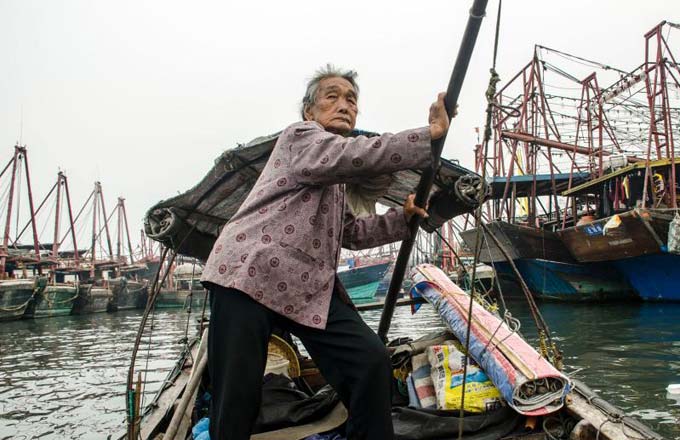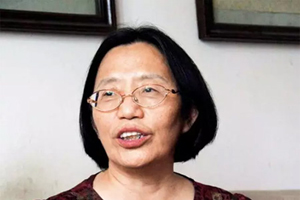Xinhua Insight: China's two sessions to highlight Xi's thoughts
BEIJING -- Having made headlines at the Davos World Economic Forum with his vigorous defense of globalization, Chinese President Xi Jinping is expected to take the spotlight in another gathering with global influence: the "two sessions" in Beijing.
The fifth session of the 12th National People's Congress (NPC), and the fifth session of the 12th National Committee of the Chinese People's Political Consultative Conference, will open on March 5 and March 3, respectively.
The annual sessions of the top legislature and top political advisory body are among the most important political events for the world's second largest economy.
The NPC is the highest body of state power, enabling the Chinese people to exercise their power as "the master of state." New state leaders will be elected at the NPC session in March 2018 after the 19th Communist Party of China (CPC) National Congress elects a new Party leadership later this year.
It was at the first session of the 12th NPC in March 2013 that Xi was elected president. He had been elected general secretary of the CPC Central Committee in November the previous year at the 18th CPC National Congress.
This year's two sessions are the first since Xi was endorsed as the core of the CPC Central Committee last October.
"Through the meetings, greater consensus will be gathered to build a moderately prosperous society and Xi's thoughts on state governance will be more clear-cut," said Xin Ming, a professor with the Party School of the CPC Central Committee.
Over the past four years, Xi's governance thoughts have been guiding China's development. The book "Xi Jinping: The Governance of China," a collection of his speeches, provides insight into his concepts, resolve and wisdom of governance. More than six million copies have been distributed worldwide.
Officials at all levels should align their thinking with Xi's strategic blueprint, the "four comprehensives," which is a four-pronged strategy to achieve a moderately prosperous society, deepen reform, advance rule of law and govern the Party strictly.
For China, the strategy creates routes to build a socialist modern country.
For observers, Xi's speeches and policy initiatives at the "two sessions" will send important signals about how China will march toward what Xi called, the "great dream of revitalizing the Chinese nation."
STRONG LEADERSHIP
Xi's governance thoughts, ranging from economic and social reform to foreign affairs and military transformation, have been greatly influencing the country's course.
In the economic sphere, Xi has led the country to achieve a remarkable growth. The country remains the top engine of global growth, with the International Monetary Fund predicting China's contribution would account for 39 percent of the world's economic expansion in 2016.
China reported 6.7 percent GDP growth in 2016, outpacing most major economies in the world.
Xi has called the current phase of growth the "new normal," as China shifts to a more sustainable development and distributes the benefits more evenly.
To ensure this crucial rebalancing is successful, Xi is advocating "a new political economy," which draws on and develops Marxist thought.
Supply-side structural reform is key to understanding the new political economy and China's future development. Fundamentally different from the "supply-side economics" in the West that focuses on tax cuts, China's supply-side structural reform involves a set of measures including dissolving overcapacity and developing the real economy.
Xi has led the country as it rolls out reforms across all sectors that advance state governance, such as consultative democracy and rule of law.
The reform-minded president also heads leading groups and commissions covering key areas including finance and economic affairs, national security, Internet security and informatization, as well as military and civilian integration. The mechanism is believed to help strengthen centralized and unified leadership of the Party in state governance.
Xi stresses placing power into an institutional cage. The decision to establish the national supervision commission to place the use of power under close supervision exemplifies this model.
To build a clean and advanced ruling party, Xi has carried out a sweeping campaign against corruption, which he warned could lead to the collapse of the Party and the downfall of the state. Since Xi took the helm of the Party, the anti-corruption fight has gained "crushing momentum" and earned popular support by netting at least 240 centrally administered officials and more than 1 million low level officials for violating CPC and government rules.
Safeguarding Xi's core status is "a political issue of the utmost importance," said senior local officials at the recently concluded sessions of legislative and political advisory bodies in China's 31 provinces, autonomous regions and municipalities.
GATHER NEW MOMENTUM
Xi and his comrades must take steps to ensure China escapes the "middle-income trap," which few developing countries have managed to avoid, and continues to open up to fuel global growth.
In his New Year speech, Xi called on the nation to "roll up our sleeves and work harder."
Prior to the two sessions, Xi visited Hebei Province and said that poverty alleviation was fundamental to building a moderately prosperous society.
During the 2013-2016 period, 55 million people have shaken off poverty -- more than the population of South Korea. China plans to eliminate poverty by 2020.
During an inspection of Beijing, Xi stressed building a people-oriented city by addressing problems of overpopulation, traffic congestion, soaring house prices and air pollution.
He also highlighted coordinated development of Beijing, Tianjin and Hebei, an ambitious project to link more than 100 million people to become an important engine for the country's economic growth. Huge progress has been made in transportation, industry and the environment in the past three years.
At a February workshop attended by officials at the provincial and ministerial levels, Xi urged them to "choose the heaviest burden and crack the hardest nuts" when pursuing economic and social development.
"Xi's speech at the workshop was grounded in Marxism and it will provide the ideological basis for the 19th CPC National Congress," said Zhu Lingjun with the Party School of the CPC Central Committee.
Xi is also striving to establish a global landscape featuring win-win results, common development and equality, highlighting the country's image as a responsible and active player in global governance.
He attended the World Economic Forum annual meeting in January, inspiring the world by advocating free trade and warning against protectionism.
Xi told the forum that China is not only the beneficiary of economic globalization, but also a contributor to it. To this end, he has repeatedly called for building "a community of shared future for mankind."
In early February, Xi and his U.S. counterpart Donald Trump held a phone conversation on bilateral ties, a good first step in consolidating relations between the world's two largest economies.
"They are the [world's] two leading nations and it is crucial that there are open communications so there are no misunderstandings," said Darrell West, director of Governance Studies at the Brookings Institution.
China will host a Belt and Road forum for international cooperation in May to make globalization more inclusive and beneficial, followed by a summit of the emerging-market bloc of BRICS (Brazil, Russia, India, China and South Africa) in September.
CONFORMITY
The two sessions are expected to drum up support for the country's next round of reforms. Thousands of deputies and political advisors will speak on various issues including economic globalization, national defense and diplomacy.
The whole Party and nation will closely unite around the CPC Central Committee with Xi as the core. "It is a necessity," said Zhang Zhao'an, deputy director of Shanghai Academy of Social Sciences. "While we are handling a complex situation at home and abroad, we can not afford to lose direction."
It is unique that an 88-million strong political party gather around its leadership and then unites and leads over 1.3 billion people toward a common destination that delivers benefits not only to themselves but also to people around the world.
"Behind all the above is the Chinese philosophy of governance, including two concepts: 'minyi,' or public opinion, and 'minxin,' the hearts and minds of the people," said Wen Yang, a researcher with the Institute of China Studies at Fudan University.
"New ideas, thoughts and strategies of state governance under the leadership of the CPC Central Committee with Xi as the core have solid foundation of public opinion. Proven successful by experience, they have won the people's support," he said. "They will become an important theme of the 'two sessions' and the CPC's 19th National Congress."
- Plan for national panda park approved
- Chinese economy to remain top engine of world growth: spokesperson
- Chinese economy to remain top engine of world growth: spokesperson
- China's top political advisory body to open annual session Friday
- Females working in e-commerce get better pay, more promotions

























